Amritha Murali
“Her music is full of gnanam and sukha-bhavam. The high level of technical competency in her singing is most aesthetically presented,” says Bombay Jayashri. Doyen vocalist, and sought-after expert and teacher, Suguna Varadachari states, “Regardless of the ragam or the kalapramanam, she sings beautifully. It is only when songs are sung properly and well that one feels like learning them oneself. She incites that feeling. She is very sincere to the art form and does not veer away to cater to the gallery.”
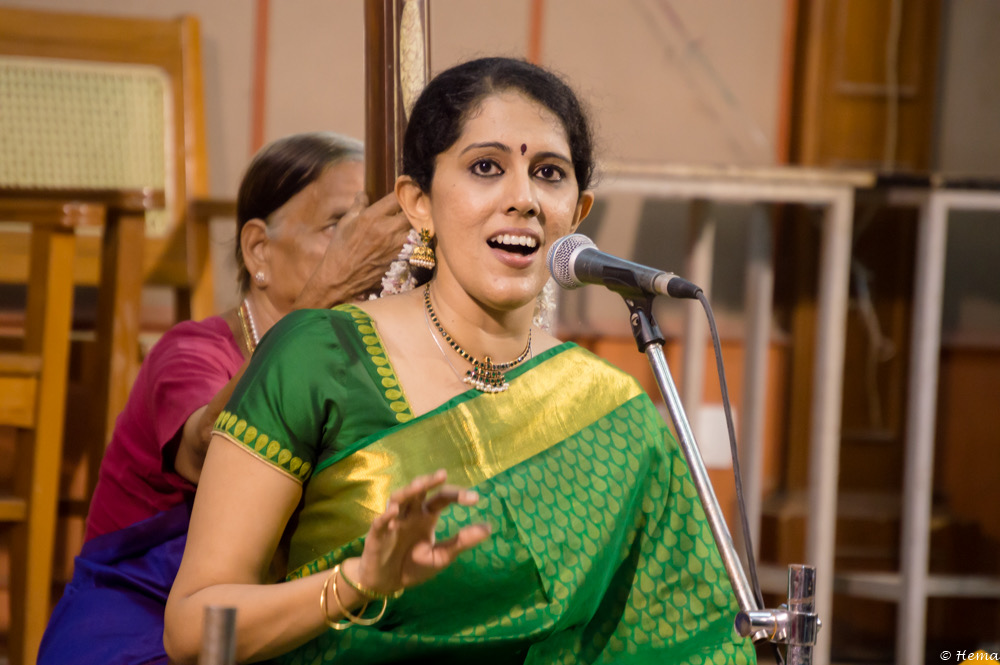
Amritha Murali has received numerous titles and awards from all the leading sabha-s in the country including several Outstanding Vocalist Awards from The Music Academy and the Ustad Bismillah Khan Yuva Puraskar from the Sangeet Natak Akademi. She is widely respected and recognised by the Carnatic music fraternity for her erudition. Senior mridangist K. Arunprakash states: “Amritha stays true to the Carnatic format, possessing all that is required yet consciously avoiding unnecessary aspects. Her sruti suddham is admirable – regardless of what she sings or at what speed, every note will be in perfect attunement to the sruti. Also, she does not rest on her laurels and keeps working to improve an already excellent skillset.”
Suguna Varadachari adds, “In addition to all these abilities, she continues to be most humble – an important but rare quality.”
Many thanks to Kum. Amritha Murali for patiently locating and sharing so many exclusive photos, the concert recording and more. A version of this article appeared in The Hindu.
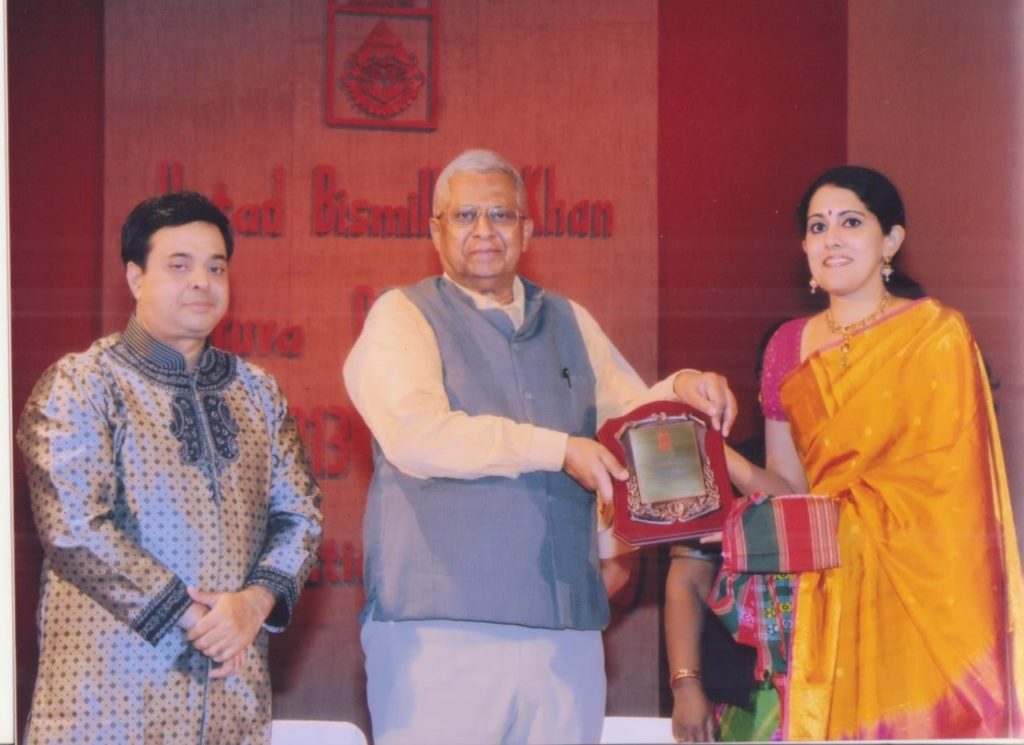
Currently under the guidance of PS Narayanaswamy (PSN)and RK Shriramkumar, her foray into music began relatively late. After initiation at age 9 by her maternal grandmother, Shankari Nagarajan, she soon began tutelage with KR Kedaranathan and his wife, Meera Kedaranathan. She also concurrently started violin under Vittal Ramamurthy, who taught her all the basic lessons, some varnam-s and kriti-s. Later, she joined T. Rukmini for advanced violin training. After about a decade with the Kedaranathans, she learned from Rama Ravi for about a year, learning some exquisite compositions in the Dhanammal bani.
PSN Parampara Festival on 14 March 2017. Scroll down for Part 2.
With her native intellect, Amritha’s progress was very fast so much so that Kedaranathan chose her, at age 12, to notate and transcribe (sometimes for hours together) the many compositions he tuned, on the spot, as he sung it. As a result, she can learn any piece from notation without difficulty. Amritha recalls many an occasion when she would change in school, grab a bite to eat in the car and head to class whose duration was unpredictable. No excuses could be given citing homework or examinations. As was typical of senior practitioners, there was no hand-holding and lot of the learning was from listening. She credits this training for sharpening and solidifying musical acumen.
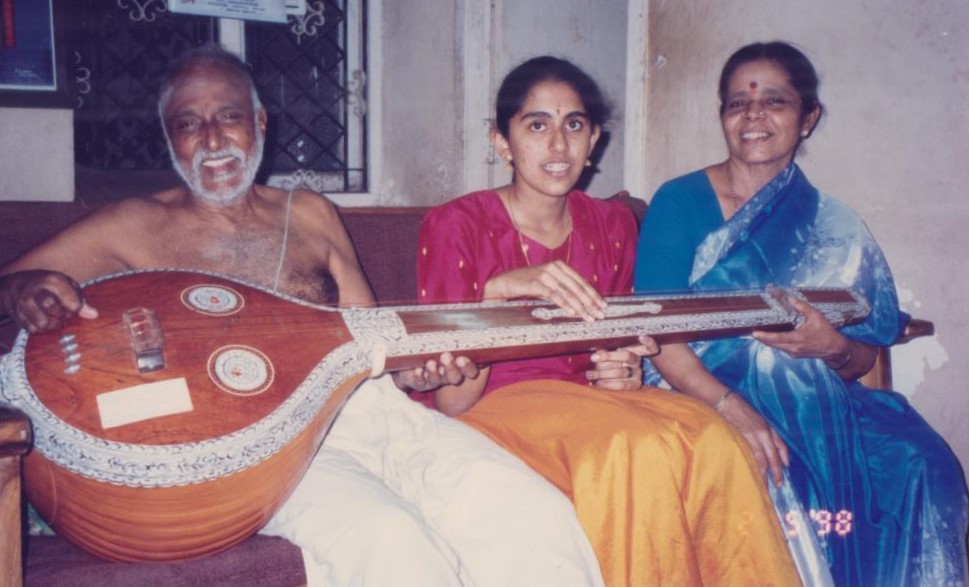
Amritha is the first in her family to have taken up music full time though everyone was exposed to the art. Her parents and Guru-s have all been very matter-of-fact without engaging in sugar-coating. “This has really helped me,” she says. “I find I constantly introspect and question myself as to how I am singing and how it can be bettered.” Music is literally on her mind 24/7.
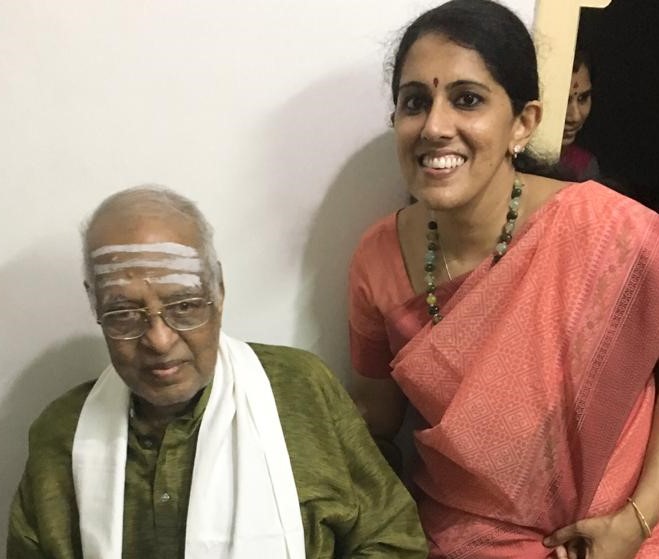
Amritha recalls performing at MS Subbulakshmi’s house when she was 13, along with Meera Kedaranathan, Seetha Rajan, Lakshmi Krishnaswamy, Sangeetha Sivakumar and Padma Sugavanam. “That was a truly memorable occasion,” she says. She explains how Meera Kedaranathan could make any person sing to tune and to talam. “Mami truly believed anyone could sing. She would repeat a line as many times as needed patiently.”
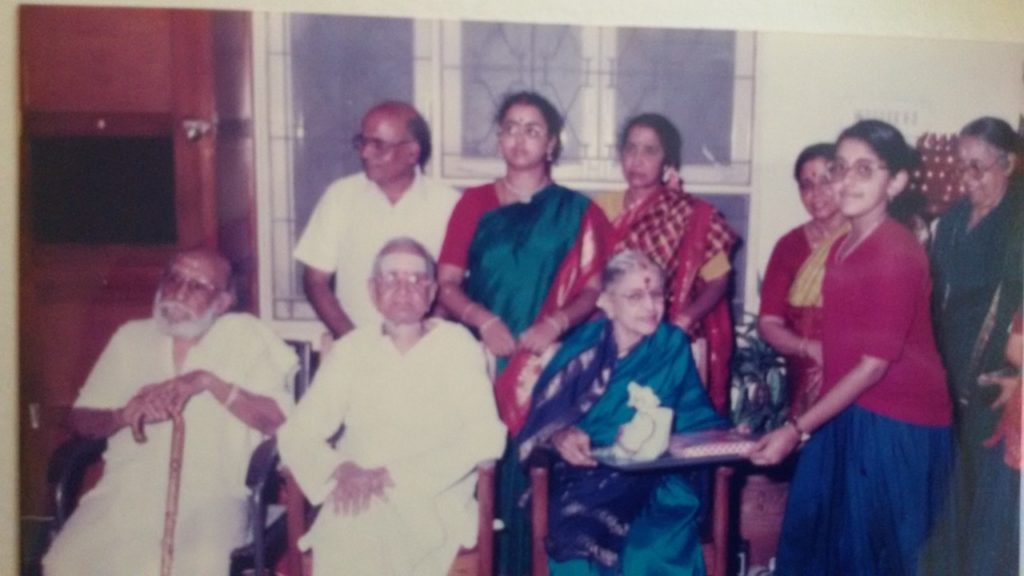
Her passion for music was well and truly ignited when she was in high school. Despite preferring Science, she decided on the Commerce stream to have more time for music. She participated in many competitions which was helpful to increase repertoire. The Kedaranathans conducted an annual Thyagaraja Utsavam where, in 1997, Amritha sang Dhyaname in Dhanyasi. Hearing that rendition, SV Krishnan immediately approached her and insisted that Amritha perform during the season for Nada Inbam. Surprised, Amritha’s mother said that she had never performed before. He would have none of it. Amritha thus gave her first concert at the age of 15 at Raga Sudha Hall on December 15th,1997. This was quickly followed in 1998 by a concert for the Semmangudi Trust and her maiden violin program for VDS Arts Academy where she played for Kunnukudi Balamurali Krishna.
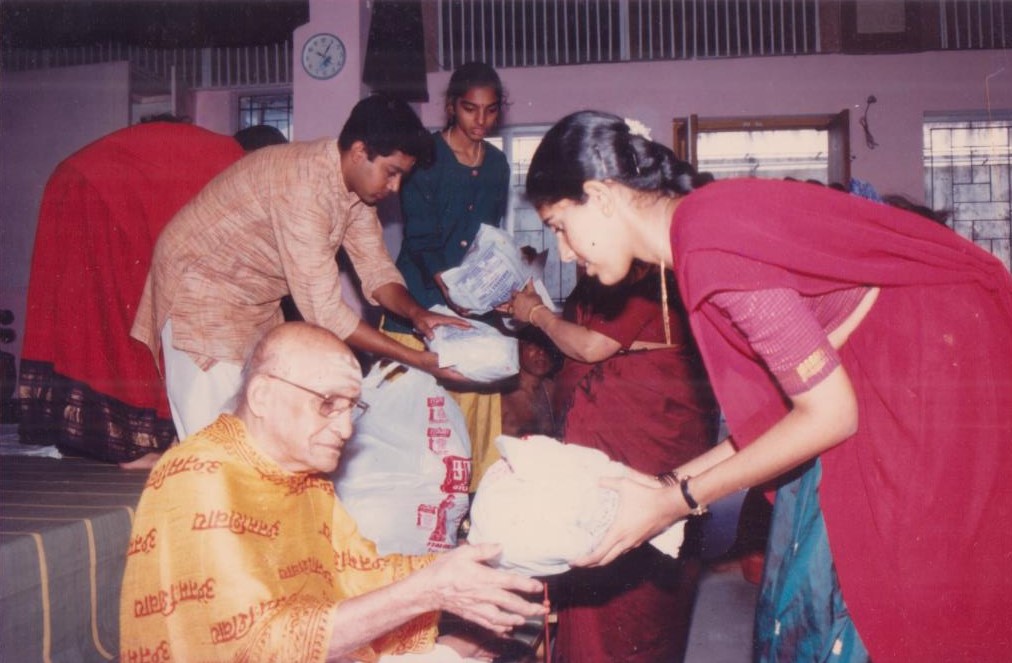
“It has been inspiring to learn from PSN mama in the tradition of Semmangudi Srinivasa Iyer. Sarvalaghu swara-s would flow seamlessly in any raga when he sang. I have learned many precious kriti-s from him. Rukmini mami is a stickler for detail and perfection. She would ensure that whatever we played would sound like how we would sing it. Her simplicity and child-like nature are lessons in humility” says Amritha. She received a Sangeet Natak Akademi fellowship to study advanced Ragam Thanam Pallavi-s under B. Krishnamoorthy.
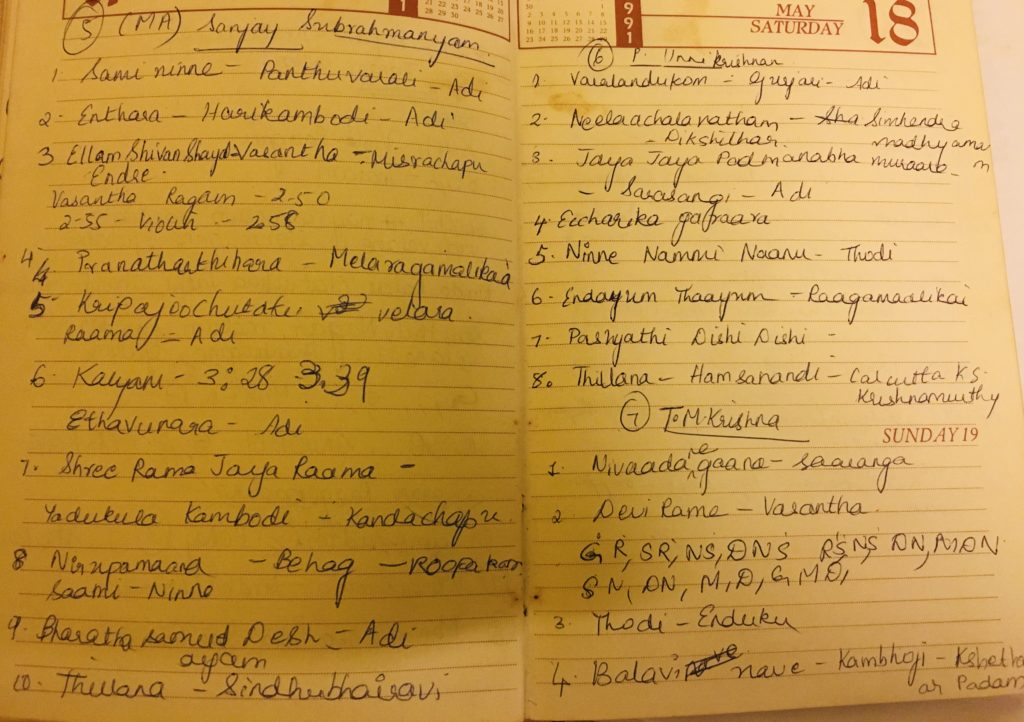
Listening is a key part of growth in music. Besides old masters on recordings, even as a young girl, her mother would drop Amritha off at concerts and pick her up just before 8 pm. “I always slept at 8 wherever I was – it was automatic. Until then, I would note down each piece that was sung and, in the case of a pallavi, I would notate it and write down the sahityam.” This, she says, gave her valuable insight into how concerts were planned. She enrolled in three Masters degrees but music having become a priority, finished only one – in Finance Management. “It continues to be my mother’s big regret,” she says ruefully.
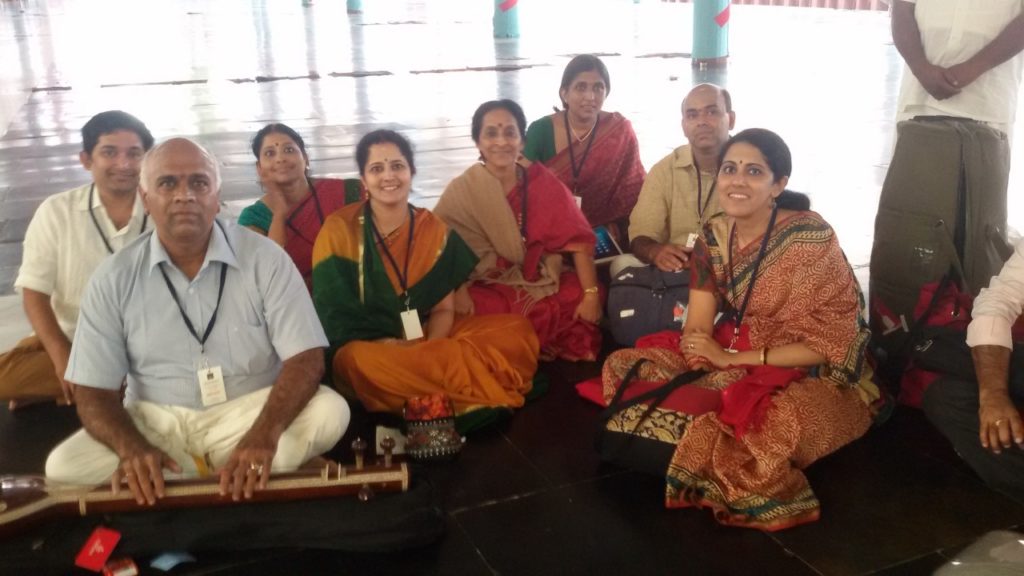
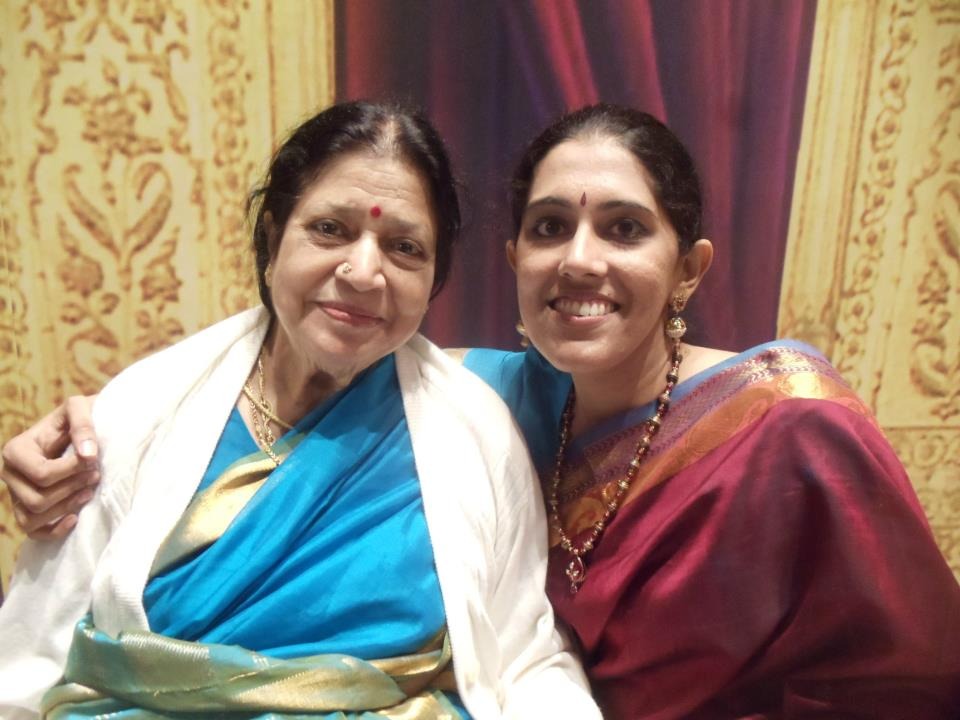
Amritha was very active in the Youth Association for Classical Music (YACM) where she also served as Vice President. She got to interact with, and listen to, many of the senior star musicians of today who were the pioneers of the youth movement then. “I got exposed to so much variety in musical styles – there is something to absorb from each person. Hearing about their own learning experiences too was most illuminating.” As part of the YACM Millennium show, with Vijay Siva, she went to several city schools and trained 500 children to sing Maithreem bhajatha at the stroke of midnight. She smilingly says she has evolved from being shy and inhibited then to being extroverted now.
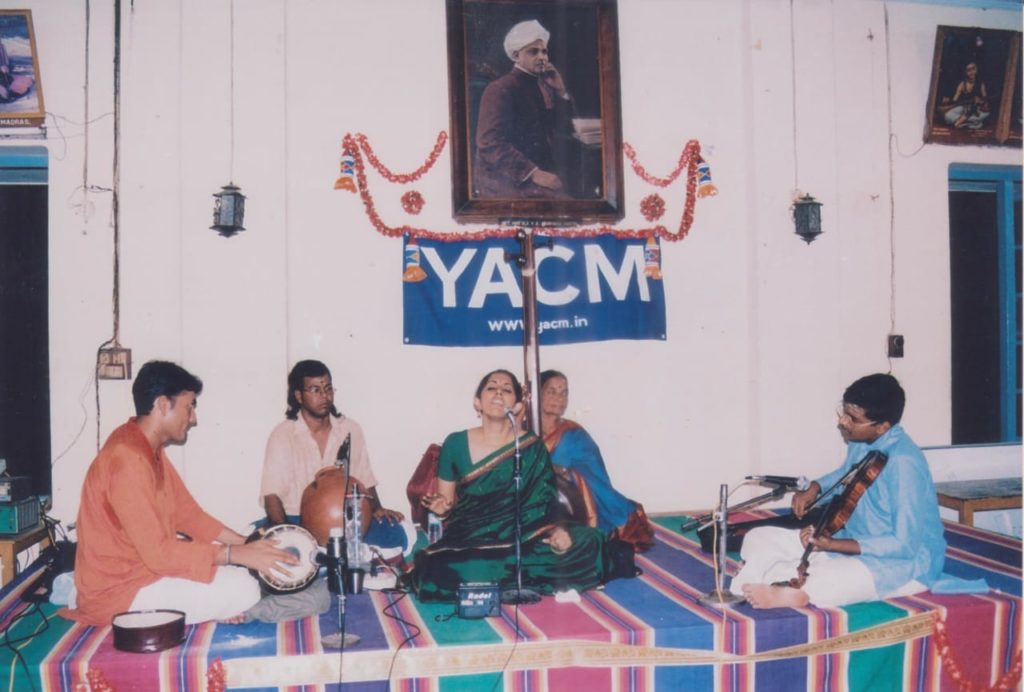
She is frequently, and incorrectly, tagged as a ‘violinist turned vocalist.’ She has always been both. She has accompanied a plethora of leading artistes and played many a duet concert with T. Rukmini.
“Learning from RK Shriramkumar anna has brought lot of freshness and contemplation into my music. His singing has left many of us in tears and awe on many occasions, inspiring us to delve deeper into the art and learn constantly,” says Amritha. It is not often that a Guru accompanies sishya-s, but Shriramkumar is one such rare individual. “His presence inspires but never intimidates.There are imperceptible things he does – like settling an odd kalapramanam with a single bow or gently stressing a note if speeding up. With him, the learning continues on stage enhancing the spontaneity in my manodharma and renditions through his playing.Above all, the most admirable thing is he will never overpower or do something we have not just because he knows or can.”
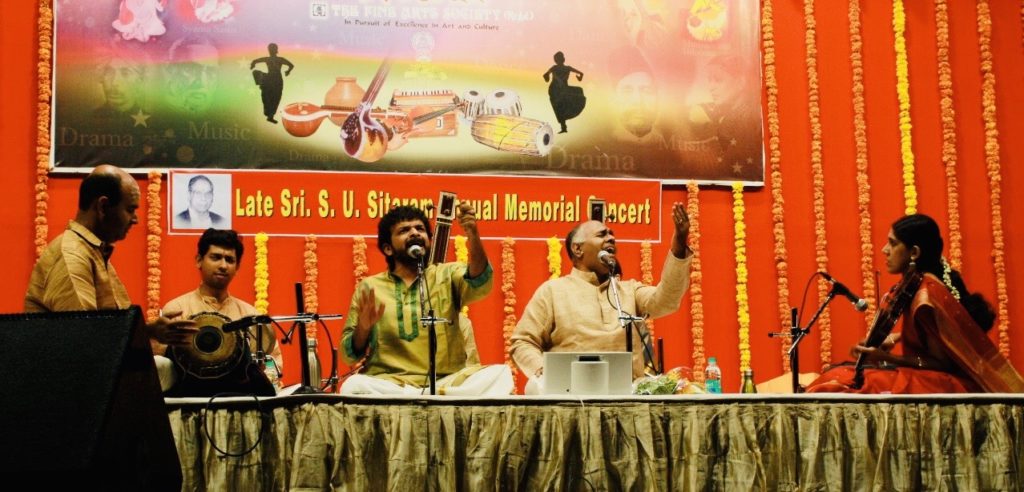
Chembur Fine Arts, Mumbai.
Amritha’s music is striking for the feeling she conveys. “Initially, we strive for correctness. But there is a level beyond that. The ragam itself takes over. I have been sensing this acutely these past few years. It often feels as though it is just the music and me. It is now an experience.” She is a stickler for singing the songs themselves exactly as taught. “If I have forgotten compositions, I just relearn them. I prefer not to mess with the rendering.”
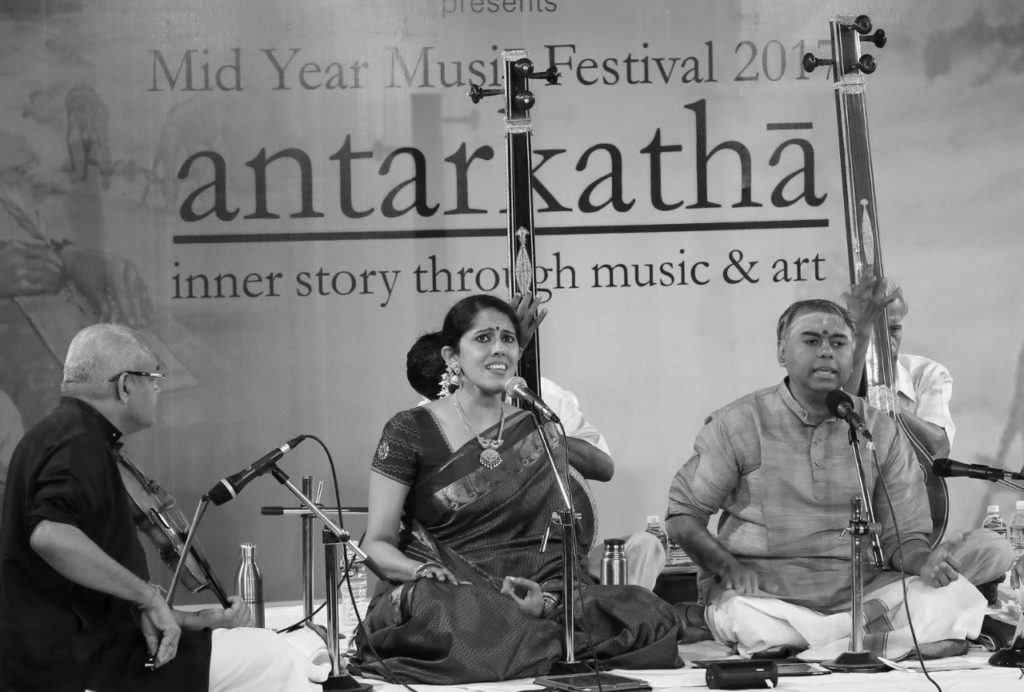
She is an integral part of ensemble performances that Shriramkumar gives with his students, often on specific themes. Amritha has also provided the vocals for many of Gowri Ramnarayan’s contemporary theatre and thematic performances. “Those were different and very enjoyable,” she says. She has participated in several workshops and lecture demonstrations for SPIC-MACAY and other organisations.
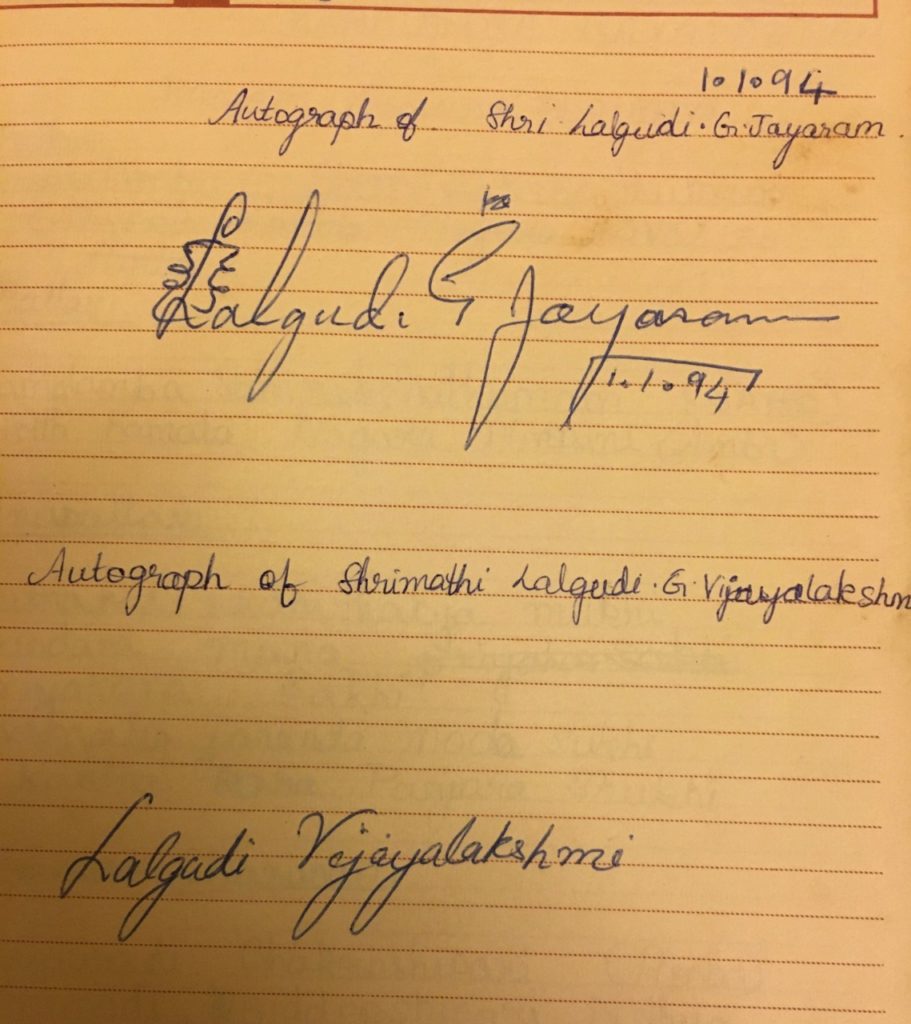
The saying goes that all are equal but some are more equal than others. And so it has been in the Carnatic world – Dr. Sowmya referred to it just recently. Women face issues just because they are women. Some artistes will not play if there is any female on stage and others if there is more than one! The ‘offending’ female violinists are usually summarily dropped, often at the last minute. Amritha, however, chooses to focus on the positives – that there are many who willingly play with no regard to gender. She also says that many sabha-s select artistes purely on merit.
Amritha also teaches and some of her students have won prizes at leading music competitions. She is kind and tender with her pupils whilst uncompromising in imparting chaste music. She explains the importance of sarva lagu swaram-s over kanakku which is often focused on more these days. “It is crucial to get the flow. To remove the anxiety, I often ask them to initially just sing with the appropriate ending note but without worrying about the ‘eduppu’. Then, I focus on bringing it into the actual tala structure. This way, it is more gradual and seems less onerous.”
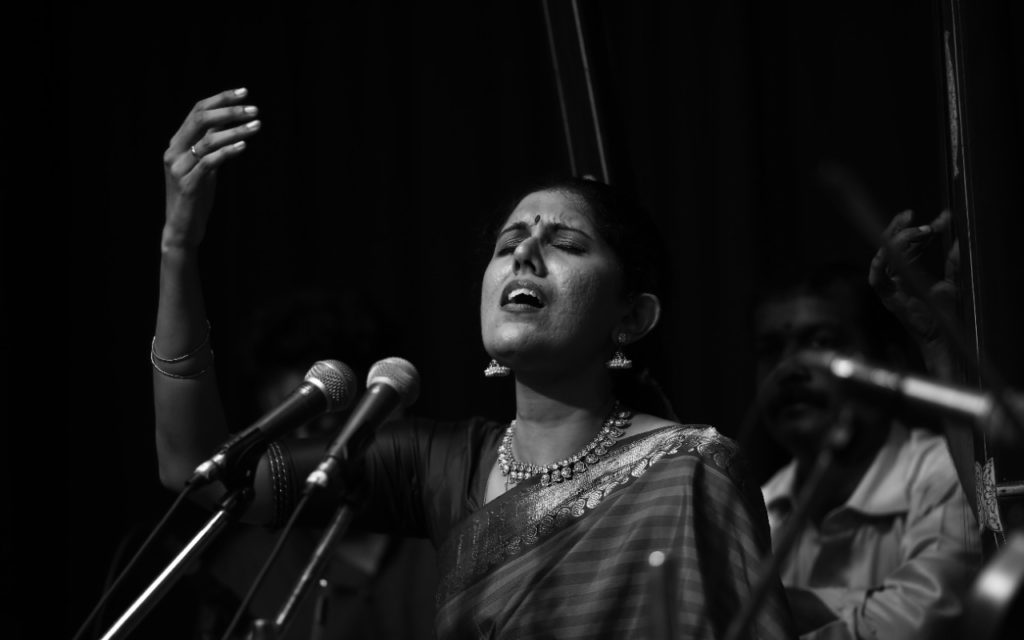
She has toured many countries including USA, Canada, UK, UAE, Australia, New Zealand, Singapore and Sri Lanka. Amritha’s first trip to Cleveland in 2007 is unforgettable for her. “I played for TK Govinda Rao Sir and Sowmya akka and it was Vellore Ramabhadran Sir on mridangam for both concerts.” The first concert she played with T. Rukmini, the maiden occasion accompanied by RK Shriramkumar and K Arunprakash at Shanmukhananda, Mumbai on MS Subbulakshmi’s birthday, her first Music Academy concert and singing in the presence of Semmangudi Srinivasa Iyer for a scholarship are other memorable moments for her.
PSN Parampara Festival on 14 March 2017. Scroll up for Part 1.
Amritha Murali has successfully married faithfulness to the Carnatic form with refined aesthetic sensibility intertwined with superior technical prowess. Her adherence to patantara and lyrics and desisting of all gimmickry make for emotive, bhava-filled music – the hallmarks of this musician who is equally at home with vocal or violin.
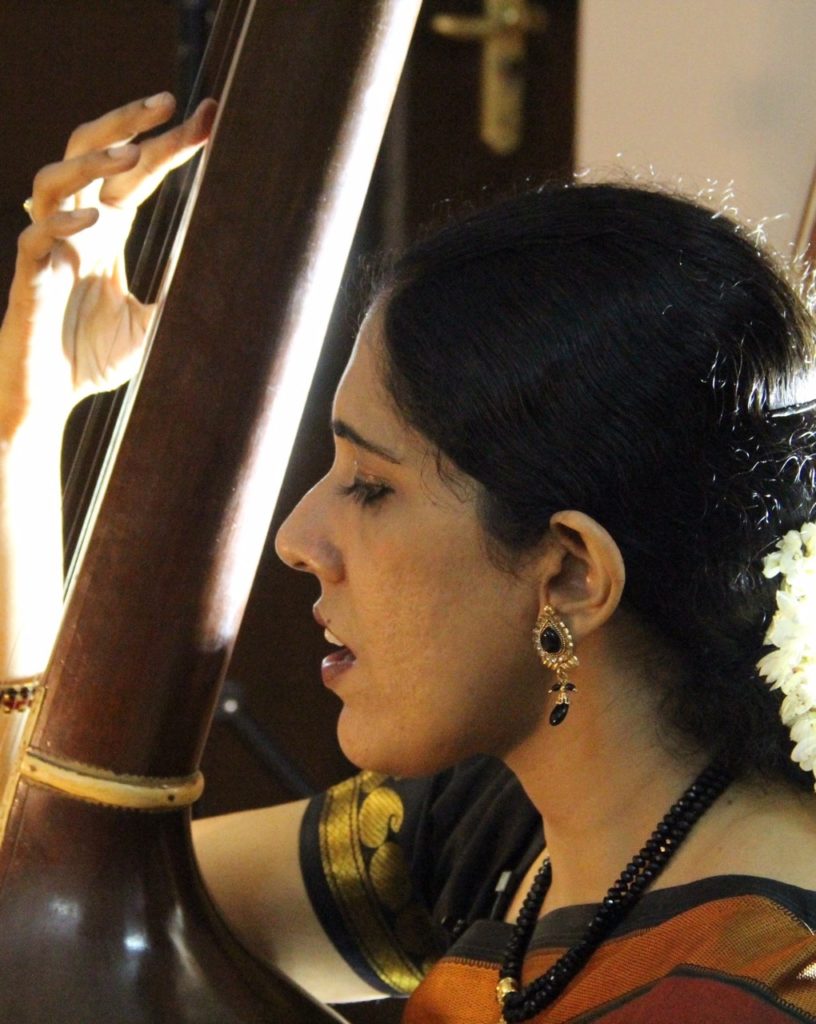
Amazing write up of the growth of Amritha’ s musical abilities. Amazing voice and clarity. Very happy to hear her performances. May God bless Amritha with good health and happiness. Bhama Sridharan